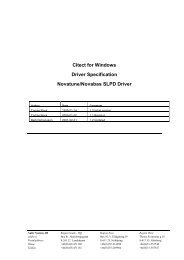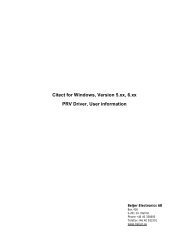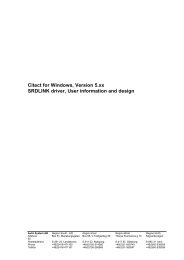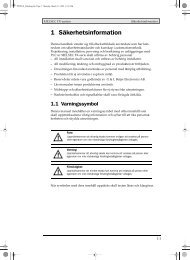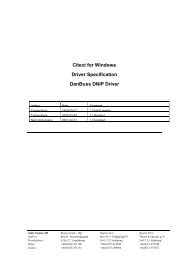Citect for Windows Driver Specification Exomatic Driver
Citect for Windows Driver Specification Exomatic Driver
Citect for Windows Driver Specification Exomatic Driver
- No tags were found...
Create successful ePaper yourself
Turn your PDF publications into a flip-book with our unique Google optimized e-Paper software.
<strong>Citect</strong> <strong>for</strong> <strong>Windows</strong><br />
<strong>Driver</strong> <strong>Specification</strong><br />
<strong>Exomatic</strong> <strong>Driver</strong><br />
Author:<br />
Date:<br />
Rev:<br />
Rev:<br />
Tomas Rook<br />
02/05/01<br />
02/07/01<br />
14/12/01<br />
Autic System AB Region South - HQ Region East Region West Region North<br />
Address Box 81, Mariebergsgatan Box 95, V.Trädgårdsg.39 Theres Svenssons g 10 Sågverksvägen 50<br />
Postaladdress S-261 22 Landskrona S-611 23 Nyköping S-417 55 Göteborg S-865 31 Alnö<br />
Phone +46(0)418-471160 +46(0)155-214990 +46(0)31-555740 +46(0)60-538055<br />
Telefax +46(0)418-471161 +46(0)155-269966 +46(0)31-555547 +46(0)60-538056
<strong>Driver</strong> Design <strong>Specification</strong><br />
Contents<br />
1. TARGET DEVICE(S) AND PROTOCOL 4<br />
1.1 Introduction 4<br />
1.2 Device Manufacturer 4<br />
1.3 Device Definition 4<br />
1.4 Communications Method 4<br />
1.5 Communications Configuration 5<br />
1.5.1 I/O Device (modules) Settings 5<br />
1.5.2 EXOtest 5<br />
1.6 Contacts 5<br />
2. PROTOCOL REQUIREMENTS 6<br />
2.1 Introduction 6<br />
2.2 Initialising the Port 6<br />
2.3 IO Device Online Test 6<br />
2.4 Error Handling 6<br />
2.5 Bad variables 6<br />
3. GENERAL DRIVER DESCRIPTION 7<br />
3.1 Implementation 7<br />
3.2 Cache 7<br />
3.3 Alarms 7<br />
3.3.1 Preserving Alarm Status 7<br />
3.3.2 Remote Alarm acknowledges (from I/O Devices) 8<br />
3.3.3 Local Alarm acknowledges (from <strong>Citect</strong>) 8<br />
3.4 Request Per<strong>for</strong>mance 9<br />
3.5 Writes 9<br />
3.6 Dial Out connections 9<br />
3.7 Redundancy 10<br />
3.8 EXOCIT.DBF 10<br />
3.8.1 TEMPLATE 10<br />
3.8.2 UNIT_TYPE 11<br />
3.8.3 RAW_TYPE, BIT_WIDTH 11<br />
3.8.4 LOW, HIGH 11<br />
3.8.5 COMMENT 11<br />
exocit.doc 2
<strong>Driver</strong> Design <strong>Specification</strong><br />
4. USER INTERFACE 12<br />
4.1 Introduction 12<br />
4.2 <strong>Driver</strong> Name 12<br />
4.3 Boards Form 12<br />
4.3.1 Board Type 12<br />
4.3.2 Address 12<br />
4.4 Ports Form 12<br />
4.4.1 Baud Rate 12<br />
4.4.2 Data Bits 12<br />
4.4.3 Stop Bits 12<br />
4.4.4 Parity 12<br />
4.4.5 Special Opt 12<br />
4.5 IO Devices Form 12<br />
4.5.1 Protocol 12<br />
4.5.2 Address 13<br />
4.6 Pulldown lists Help 13<br />
4.7 IO Device Data Types and Formats 13<br />
4.8 IO Device Function Blocks and their Parameters (EXOCIT.DBF) 13<br />
4.9 PROTDIR.DBF 14<br />
4.10 Parameters and INI options 14<br />
4.10.1 Standard Parameters 14<br />
4.10.2 <strong>Driver</strong> Specific Parameters 14<br />
4.11 <strong>Driver</strong> Specific Errors 15<br />
4.12 <strong>Driver</strong> Error Help 15<br />
4.13 Debug Messages 15<br />
4.14 Stats Special Counters 16<br />
4.15 Hints and Tips 16<br />
5. PERFORMANCE TESTING 18<br />
5.1 Introduction 18<br />
5.2 Calculating the Blocking Constant – Not applicable 18<br />
5.3 References 18<br />
exocit.doc 3
<strong>Driver</strong> Design <strong>Specification</strong><br />
1. Target Device(s) and Protocol<br />
1.1 Introduction<br />
This section defines the types of I/O Devices that are targeted by this driver.<br />
1.2 Device Manufacturer<br />
<strong>Exomatic</strong> AB<br />
Garvaregatan 4<br />
Box 64<br />
SE-260 20 TECKOMATORP<br />
SWEDEN<br />
Phone: +46 (0)418 661020<br />
1.3 Device Definition<br />
The driver is intended <strong>for</strong> the ExoFlex line of devices and all older devices that communicates with the<br />
<strong>Exomatic</strong> EXOapt software package.<br />
These devices have a configurable number of I/O’s (digital input, analog input, analog output etc, commonly<br />
named PIFA’s).<br />
1.4 Communications Method<br />
Serial RS-232, directly connected or through another device (pipe). The driver have some support <strong>for</strong> dialout.<br />
The ExoFlex devices also may use TCP/IP. Older devices need an external terminal server to be<br />
able to establish TCP/IP communication.<br />
The <strong>Citect</strong> driver itself incorporates the methods and procedures that are exported by the ExoScan DLL<br />
(using another DLL, ExoCitEx). This DLL takes care of all physical communication to the ExoCom, ExoName<br />
and other DLL’s that may be needed <strong>for</strong> the actual communication to take place. This way, only<br />
one channel (board) is used to communicate with several devices. To accomplish this, the driver is incorporated<br />
as a board driver.<br />
RS-232<br />
:<br />
ExoFlex (pipe)<br />
RS-485 (or TCP/IP)<br />
ExoFlex<br />
exocit.doc 4
<strong>Driver</strong> Design <strong>Specification</strong><br />
1.5 Communications Configuration<br />
The <strong>Exomatic</strong> System and EXOapt need to be installed be<strong>for</strong>e the ExoCit driver is installed. ExoCit<br />
driver will automatically install necessary extra <strong>Exomatic</strong> provided files.<br />
1.5.1 I/O Device (modules) Settings<br />
I/O Devices are named Modules in the <strong>Exomatic</strong> environment. All devices need to be configured in the<br />
<strong>Exomatic</strong> software tool EXOapt to provide communication with the PC (i.e. EXOtest). This configuration<br />
is out of this manual’s scope and are well described in the <strong>Exomatic</strong> documentation.<br />
1.5.2 EXOtest<br />
The <strong>Exomatic</strong> software tool EXOtest (which is included in the EXOapt package) should be used to verify<br />
that the connectivity to <strong>Exomatic</strong> devices is ok. Any per<strong>for</strong>mance or connectivity issue should be solved<br />
at this level, be<strong>for</strong>e trying to connect using <strong>Citect</strong>. If the communication works well at this level, it will<br />
most likely work well in <strong>Citect</strong>.<br />
1.6 Contacts<br />
Autic System AB, Box 81, SE-261 22 LANDSKRONA +46 (0)418-471160<br />
<strong>Exomatic</strong> AB, Box 64, SE-260 20 TECKOMATORP +46 (0)418-661020<br />
TroSoft HB, Box 2055, SE-144 03 RÖNNINGE +46 (0)8-53257262<br />
exocit.doc 5
<strong>Driver</strong> Design <strong>Specification</strong><br />
2. Protocol Requirements<br />
2.1 Introduction<br />
This section documents all the requirements of the protocol itself.<br />
2.2 Initialising the Port<br />
No special initialisation is necessary.<br />
2.3 IO Device Online Test<br />
The drivers’ response to CTDRV_INIT_UNIT and CTDRV_STATUS_UNIT is that they always are online.<br />
The offline detection is made when any physical variable is read. If the <strong>Exomatic</strong> DLLs (hereafter referred<br />
to as ExoCitEx which is the DLL ExoCit communicates through) respond with an ALM_COMERR error<br />
to the EXOcitexReadVariable() function then a DRIVER_UNIT_OFFLINE error is returned to <strong>Citect</strong>.<br />
The reason to use this ‘always online’ scenario is that alarm polls are made directly to the locally<br />
cached alarm list. This list is provided even if the devices are physically not connected to prevent dialouts<br />
to occur <strong>for</strong> alarm polls.<br />
2.4 Error Handling<br />
Following responses from ExoCitEx are possible:<br />
ALM_COMERR<br />
ALM_DOESNOTEXISTS<br />
ALM_DATAERR<br />
ALM_NODATA<br />
ALM_OK<br />
Results in a DRIVER_UNIT_OFFLINE return.<br />
Results in a DRIVER_ADDRESS_RANGE_ERROR return.<br />
Results in a DRIVER_BAD_DATA_TYPE return.<br />
Results in a DRIVER_TIMEOUT return if the timeout time has expired.<br />
Results in a NO_ERROR and value return.<br />
The timeout parameter used is the standard [ExoCit]TimeOut parameter used in CITECT.INI. It defaults<br />
to 20000 ms. This parameter would most likely need to be changed <strong>for</strong> a dial out connection. The<br />
transmit retry counter is not in use.<br />
2.5 Bad variables<br />
All variables should be defined using the ExoTag tool to ensure consistancy between the module definition<br />
and the <strong>Citect</strong> variable database.<br />
When the driver DLL is loaded by <strong>Citect</strong>, its OpenChannel() procedure will call the EXOcitexIsVariable()<br />
function to verify that the variable is valid in the <strong>Exomatic</strong> configuration. This is done towards the selected<br />
project in EXOapt. If the variable is invalid, the driver will stop the loading process and show a<br />
message box indicating this error condition. When the user acknowledges the message box the driver<br />
will continue to load.<br />
If the variable is asked <strong>for</strong> later on, the driver will return the DRIVER_ADDRESS_RANGE_ERROR error<br />
message.<br />
exocit.doc 6
<strong>Driver</strong> Design <strong>Specification</strong><br />
3. General <strong>Driver</strong> description<br />
3.1 Implementation<br />
This driver is written as a board driver. It communicates using <strong>Exomatic</strong> provided DLLs that encapsulates<br />
the actual protocol levels to ensure future, and backward, compability. There<strong>for</strong>e this driver may<br />
only be loaded in one instance. The driver will cause ExoCitEx.DLL to be loaded, which in turn loads and<br />
run the ExoCiPmp.EXE file. The ExoCiPmp’s only task is to load a new instance of ExoCitEx.DLL (that<br />
runs in ExoCiPmp’s process space) and load the ExoScan2.DLL. ExoCiPmp then connects the method<br />
callback addresses of ExoScan2.DLL to ExoCitEx.DLL. This way, the ExoScan2 DLL has an own thread<br />
that may per<strong>for</strong>m all connect/disconnect, trend logging and house-keeping tasks without <strong>Citect</strong> being involved.<br />
The two instances of ExoCitEx holds a mirror object and per<strong>for</strong>m task switching when needed.<br />
3.2 Cache<br />
This driver does not hold an own cache, but works in an asynchronously way close to ExoCitEx. Exo-<br />
CitEx holds and internal cache of recent adviced variables. It is there<strong>for</strong>e important that ExoCit has<br />
enough commands pending to ensure that the cached variables won’t time out. The default timeout of<br />
ExoCitEx is 2400 ms and may be changed by adding [ExoCitEx]AdviseTO parameter in the<br />
EXOMATIC.INI file in the <strong>Windows</strong> directory. The default [ExoCit]MaxPending parameter is 40. Increasing<br />
this parameter will cause ExoScan to do more effective batch reads, and will significally decrease<br />
response time <strong>for</strong> alarm reads. A value of up to 200 is not unrealistic.<br />
3.3 Alarms<br />
Due to the nature of this type of devices, several configurations are based upon dial-out connections.<br />
The devices may be set up to do automatic dial-in when an alarm has occurred. When a device is calling,<br />
it is polled <strong>for</strong> all alarm events, not only the one that caused the dial-in.<br />
At startup time, the driver ‘subscribe’ on the variable tags that are needed <strong>for</strong> alarms (the <strong>Exomatic</strong> system<br />
also verifies that it is a valid alarm variable). This means that <strong>Citect</strong> polls the alarm tags, but the<br />
driver just returns the last known state from its internal cache and continously asks ExoCitEx <strong>for</strong> any<br />
new alarm events. When any new alarm events has occurred, the driver gets them from ExoCitEx and do<br />
a lookup in the cached variable array <strong>for</strong> the corresponding tag and sets its new state. <strong>Citect</strong> will be notified<br />
at next alarm poll (by default within 2 seconds).<br />
The driver will never return any error message when <strong>Citect</strong> polls the alarm variables (unless the variable<br />
was detected as invalid at subscription time).<br />
The drivers command queue is polled <strong>for</strong> alarm DCBs at the [ExoCit]Delay interval, which defaults to 50<br />
ms. This gives an average response time <strong>for</strong> alarm polls of 25 ms. Within this interval, the driver returns<br />
all alarm DCBs, that is why Kernel show an extraordinary per<strong>for</strong>mance of digital reads.<br />
3.3.1 Preserving Alarm Status<br />
When the status is changed <strong>for</strong> an alarm point (either by alarm events arriving from I/O devices or Alarm<br />
Acks made from <strong>Citect</strong>) it is written to the Alarm Status file cache. The alarm status file updates will be<br />
flushed when next AlarmCleanup call is made, which by default is within 1000 ms. It is configurable by<br />
the [ExoCit]AlarmCleanupTime in CITECT.INI. This ensures that the alarm list is persistant throughout<br />
the system, even if an unexpected power failure occurs.<br />
exocit.doc 7
<strong>Driver</strong> Design <strong>Specification</strong><br />
The alarm status file is named Exo_PortName.ALM where PortName is the port name used in the <strong>Citect</strong><br />
configuration. The path of the file may be set by using the CITECT.INI [ExoCit]AlarmFilePath parameter.<br />
It defaults to the run path of the selected <strong>Citect</strong> project.<br />
The driver will read this file (if existing) at startup time and set the last known status be<strong>for</strong>e the driver responds<br />
to any alarm polls.<br />
By deleting this file, all alarm status’ are set to INACTIVE.<br />
3.3.2 Remote Alarm acknowledges (from I/O Devices)<br />
If the alarm event was an acknowledge (or block/unblock), the state is stored just like a normal alarm<br />
event, but it also resets the CiCode trigger. When <strong>Citect</strong> has done next alarm poll, the AlarmCleanup<br />
task (after a slight delay) will begin to try acknowledging the alarm. This is done to ensure that a system<br />
using extremly slow alarm poll intervals won’t do unnecessary CiCode calls, i.e. try to acknowledge any<br />
unexisting alarm event etc.<br />
Any block/unblock and acknowledge that arrives from the devices are sent to <strong>Citect</strong> using CiCode from<br />
the driver. This is accomplished by ctAPI calls using a separate thread (the CiCode thread). This means<br />
that this driver will consume one ctAPI connectivity license to be able to per<strong>for</strong>m these actions. The<br />
ctAPI is not opened/closed between every period of ack’s etc, which means that the connectivity license<br />
usage is permanent. If ctAPI should not to be used (to preserve a connectivity license or prevent remote<br />
acknowledges) then it may be disabled by setting the [ExoCit]AlarmCiCodeTries to 0. This will prevent<br />
the CiCode thread from running and there<strong>for</strong>e disable <strong>Citect</strong> from detecting alarm acknowledges made at<br />
the device display.<br />
3.3.3 Local Alarm acknowledges (from <strong>Citect</strong>)<br />
When the alarm is acknowledged in the Alarms Page in <strong>Citect</strong>, it is done using a CiCode call, ExoAlarmAck(),<br />
supporting the Animation Number of the alarm. The CiCode will set the Exo_AlarmAck variable<br />
tag (which is defined as a string) to the tagname of the alarm tag. The tag name is defined as module:number,<br />
i.e. ccm:42 which means module ccm, variable tag 42. The driver will do a lookup in the<br />
alarm variable list <strong>for</strong> this I/O Device and do an AlarmAck method call into ExoCitEx <strong>for</strong> this variable.<br />
There is a sample <strong>Exomatic</strong> project and also a matching <strong>Citect</strong> project provided with the driver that holds<br />
a sample Alarms Page template in VGA default mode that is configured <strong>for</strong> this. The CiCode below is<br />
included in the very same project.<br />
Alarm must be setup in the EXOapt Alarm Scan Tool to call computer station upon alarm events.<br />
FUNCTION<br />
ExoAlarmAck(INT hAN)<br />
STRING sTag;<br />
sTag = AlarmGetDsp(hAN, "Type");<br />
If StrSearch(0, sTag, "UN") -1 THEN<br />
sTag = AlarmGetDsp(hAN, "Tag");<br />
IF StrSearch(0, sTag, ":") -1 THEN<br />
Exo_AlarmAck = sTag;<br />
ConfirmAlarm(sTag);<br />
ELSE<br />
AlarmAck(0, 0);<br />
END<br />
END<br />
END<br />
FUNCTION<br />
exocit.doc 8
<strong>Driver</strong> Design <strong>Specification</strong><br />
ConfirmAlarm(string AlarmTag)<br />
int AlarmRec;<br />
int hTask;<br />
AlarmRec = AlarmFirstTagRec(AlarmTag,"","");<br />
WHILE AlarmRec -1 DO<br />
// First check if the alarm is really active<br />
IF AlarmGetFieldRec(AlarmRec,"OnTime") "0" THEN<br />
// And we haven't acked it yet<br />
IF AlarmGetFieldRec(AlarmRec,"AckTime") = "0" THEN<br />
//Acknowledge the current record<br />
AlarmAckRec(AlarmRec);<br />
END<br />
END<br />
AlarmRec = AlarmNextTagRec(AlarmTag,"","","");<br />
END<br />
// hTask=TaskHnd();<br />
// TaskKill(hTask);<br />
END<br />
STRING FUNCTION ReadFieldRec(INT iRecord, STRING sField)<br />
//<br />
// AlarmGetFieldRec wrapper <strong>for</strong> <strong>Exomatic</strong><br />
//<br />
// Last Update: 2001-10-11/TR<br />
//<br />
END<br />
return AlarmGetFieldRec(iRecord, sField);<br />
3.4 Request Per<strong>for</strong>mance<br />
Due to the nature of this driver, and the possibility to do internally cached reads, <strong>Citect</strong> automated<br />
blocked reads are turned off. The first response time <strong>for</strong> a directly connected device is about 50 ms, <strong>for</strong> a<br />
piped device (over RS-485) 200 ms. This is the total response time <strong>for</strong> five variables read in the same<br />
‘batch’ the same time. The response time from the driver is less than 50 ms <strong>for</strong> following requests of the<br />
same variables.This is the time the driver needs to reply to <strong>Citect</strong> requests, and is strictly bound to the<br />
Delay parameter.<br />
The driver immediately sends requests to ExoCitEX which will do an internal blocking of the questions to<br />
external devices. If neccesary, they will be called (dial out). Due to the asynchronously nature of the requests<br />
the answers to <strong>Citect</strong> will not be in the order the arrived to the driver.<br />
3.5 Writes<br />
Write requests are never cached, they are per<strong>for</strong>med at once. However, <strong>Citect</strong> may push a lot of write<br />
DCB’s at the same address if the user use a Slider etc to set the value, and let it use ‘Continous update<br />
of tag’. The driver could get a lot of consecutive write requests to the same address, and will handle<br />
them in the order they arrived. If it is a dial out device, it will be called using the default disconnect timeout<br />
to decide when to disconnect if [ExoCit]AutoConnect in CITECT.INI is set to 1.<br />
3.6 Dial Out connections<br />
Dial out may be done in two separate ways, either automatically or manually. If done automatically, the<br />
driver will immediately call the Connect method in ExoCitEx when <strong>Citect</strong> asks <strong>for</strong> a variable that belongs<br />
exocit.doc 9
<strong>Driver</strong> Design <strong>Specification</strong><br />
to a dial out device. When the variable is not asked any more (picture is changed etc) the driver will call<br />
the Disconnect method in ExoCitEx when the connection timer expires.<br />
Alarm polls will never initiate a dial out, because the alarm variable states are always returned by the local<br />
cache.<br />
The automatic disconnections are done using the [ExoCit]ConnectTimeout parameter in CITECT.INI<br />
which defaults to 20000 ms. If it is set to 0, it will never hangup unless the Connect variable is <strong>for</strong>ced to<br />
0.<br />
3.7 Redundancy<br />
The <strong>Exomatic</strong> devices does not support double masters, and it is there<strong>for</strong>e not possible to set up redundancy<br />
using the normal mechanism in <strong>Citect</strong>.<br />
3.8 EXOCIT.DBF<br />
The database specification contains all parameter types that <strong>Citect</strong> may ask <strong>for</strong>. Generally all variables<br />
(both local and global) defined in the downloaded blocks may be read and (if applicable) written by<br />
<strong>Citect</strong>.<br />
There is no support <strong>for</strong> variable arrays. They must be read as individual variables.<br />
3.8.1 TEMPLATE<br />
The address of the variable is multiplied by 256 to avoid <strong>Citect</strong> blocking. Blocking is made internally by<br />
ExoScan.<br />
The address is always the variable name used in the blocks loaded into the I/O Device. Ex points in<br />
StdObj.DPE or PIFA.DPE etc may be used. The address must be entered using the <strong>for</strong>mat<br />
R2:Pifa.Visare1<br />
Where<br />
R<br />
Datatype in the <strong>Exomatic</strong> system. R stands <strong>for</strong> REAL (could also be L <strong>for</strong> DIGITAL, X<br />
<strong>for</strong> BYTE, I <strong>for</strong> INTEGER or T <strong>for</strong> STRING).<br />
Variables that will be associated with an alarm tag is defined using A <strong>for</strong> the digital<br />
alarm state (INACTIVE or ACTIVE), Q <strong>for</strong> the long UTC of the last state change and<br />
X <strong>for</strong> the byte that holds the <strong>Exomatic</strong> alarm status. All three types must be defined<br />
using the same key.<br />
2 Key. The key must be unique <strong>for</strong> all individual variables used in the associated I/O device.<br />
It does not need to be system unique. The keys are used by the driver to determine<br />
the fully address (which follows the ‘:’) from its internal list of all variables defined<br />
that are associated to this driver in the project and all its includes. The key is an unsigned<br />
short (ranges from 0-65535). The key is automatically created by ExoTag that<br />
ensures that it will be unique.<br />
The key number is multiplied by 256 to turn off <strong>Citect</strong> blocking and is provided by<br />
<strong>Citect</strong> to the driver as the DCB point address.<br />
: Delimiter<br />
Pifa.Visare1<br />
The fully variable address, i.e. Vpac.Variable etc.<br />
exocit.doc 10
<strong>Driver</strong> Design <strong>Specification</strong><br />
When the driver is loaded, it scans through the user directories to find the include projects and all variables<br />
belonging to this driver and loads it into the memory. This way the driver uses the key, which is<br />
provided in the DCB, to gain access to the variable names.<br />
3.8.2 UNIT_TYPE<br />
The unit types are used to differ between normal variable requests and other types.<br />
3.8.3 RAW_TYPE, BIT_WIDTH<br />
The driver support the <strong>Exomatic</strong> variable types described above. Type casting is not supported, i.e. if the<br />
user tries to use another type that specified, the driver will most likely respond with a ‘Database size too<br />
big’ error.<br />
3.8.4 LOW, HIGH<br />
Is limited by the key type, which is unsigned short, i.e. 0-65535.<br />
3.8.5 COMMENT<br />
The comment row hold some info about the different unit types.<br />
exocit.doc 11
<strong>Driver</strong> Design <strong>Specification</strong><br />
4. User Interface<br />
4.1 Introduction<br />
This section defines how the user will see the driver. This relates directly to how the <strong>Citect</strong> <strong>for</strong>ms need<br />
to be filled out and any special INI options. For the kernel, the debug trace messages and the<br />
Stats.Special counters are documented.<br />
4.2 <strong>Driver</strong> Name<br />
EXOCIT<br />
4.3 Boards Form<br />
Only one board of this type may be set up <strong>for</strong> each I/O Server.<br />
4.3.1 Board Type<br />
EXOCIT<br />
4.3.2 Address<br />
0<br />
4.4 Ports Form<br />
4.4.1 Baud Rate<br />
None<br />
4.4.2 Data Bits<br />
None<br />
4.4.3 Stop Bits<br />
None<br />
4.4.4 Parity<br />
None<br />
4.4.5 Special Opt<br />
None<br />
4.5 IO Devices Form<br />
4.5.1 Protocol<br />
EXOCIT<br />
exocit.doc 12
<strong>Driver</strong> Design <strong>Specification</strong><br />
4.5.2 Address<br />
The address field should be the EXOapt module name, i.e.<br />
ccm<br />
etc.<br />
The name field should hold the same name as the address field. It is not necessary, but if not, it<br />
will make ExoTag to not recognising the I/O device and cause the keys to be out of order if tags<br />
are added.<br />
4.6 Pulldown lists Help<br />
The following entries should be included in the <strong>Citect</strong> Help.DBF spec file.<br />
TYPE DATA FILTER<br />
BOARDTYPE<br />
PROTOCOL<br />
EXOCIT<br />
EXOCIT<br />
4.7 IO Device Data Types and Formats<br />
IO Device Data Type Valid Range <strong>Citect</strong> Data Type Description<br />
R 3.4E +/- 38 REAL 7 digits<br />
X 0-255 BYTE<br />
I -32768 - +32767 INT<br />
L 0 - 1 DIGITAL<br />
T<br />
STRING<br />
A 0 - 1 DIGITAL Alarm state, INACITVE/ACTIVE<br />
Q -2147483648 -<br />
+2147483647<br />
LONG Last alarm event time in UTC (seconds since 1/1-<br />
1970)<br />
4.8 IO Device Function Blocks and their Parameters (EXOCIT.DBF)<br />
TEMPLATE UNIT_TYPE RAW_TYPE BIT_WITH LOW HIGH COMMENT<br />
L%U%*256:%! 0x00000001 0 1 0 65535 Vpac variable of type Digital (0/1)<br />
X%U%*256:%! 0x00000001 8 8 0 65535 Vpac variable of type Unsigned Integer (0-<br />
255)<br />
I%U%*256:%! 0x00000001 1 16 0 65535 Vpac variable of type Signed Integer (-<br />
32768/+32767)<br />
R%U%*256:%! 0x00000001 2 32 0 65535 Vpac variable of type Float<br />
T%U%*256:%! 0x00000001 7 1024 0 65535 Vpac variable of type Text<br />
A%U%*256:%! 0x00010000 0 1 0 65535 Alarm State<br />
Q%U%*256:%! 0x00020000 4 32 0 65535 Alarm Time<br />
ACK 0x00080000 7 1024 0 0 Acknowledge of an alarm in <strong>Citect</strong> should<br />
cause a write to this variable with the alarm<br />
tag name. The alarm tag name should consist<br />
of the module name and the key to the associated<br />
variable tag. I.e. ccm:42 etc. This tag<br />
should be defined at the ccm <strong>for</strong> the system<br />
exocit.doc 13
<strong>Driver</strong> Design <strong>Specification</strong><br />
and it needs to be defined only once. It<br />
should be named Exo_AlarmAck.<br />
COMERR 0x00200000 1 16 0 1 Last known communication error <strong>for</strong> the<br />
associated I/O device.<br />
CONNECT 0x00210000 0 1 0 1 Is set to 1 to <strong>for</strong>ce a dial out to be per<strong>for</strong>med<br />
<strong>for</strong> the associated I/O device. Set to 0 to<br />
<strong>for</strong>ce a hang up.<br />
CONNECTSTATUS 0x00220000 1 16 0 1 Connect status <strong>for</strong> the associated I/O device.<br />
4.9 PROTDIR.DBF<br />
TAG FILE BIT_BLOCK MAX_LENGTH OPTIONS<br />
EXOCIT EXOCIT 16 256 0x0cf<br />
4.10 Parameters and INI options<br />
4.10.1 Standard Parameters<br />
Block 256 (<strong>Citect</strong> blocking is always prohibited)<br />
Delay 50 ms<br />
MaxPending 40<br />
Polltime 0 ms (interrupt driven)<br />
Timeout 20000 ms<br />
Retry 3 (not used)<br />
WatchTime 30 s<br />
4.10.2 <strong>Driver</strong> Specific Parameters<br />
All ExoCit specific parameters are located in the section [ExoCit]<br />
PARAMETER DEFAULT DESCRIPTION<br />
AlarmCleanupTime 1000 (ms) The time interval the driver do house keeping of the alarm processes, i.e. scans<br />
<strong>for</strong> alarm acknowledged to be sent to <strong>Citect</strong>.<br />
AlarmCiCodeInterval 5000 (ms) The time that elapses between two alarm acknowledge tries. Be<strong>for</strong>e the driver<br />
begins the alarm acknowledge process of an alarm, it ensures that <strong>Citect</strong> has<br />
read it.<br />
AlarmCiCodeTries 4 The number of tries that maximum should be done. If the driver succeeds in the<br />
first attempt, it will not try again. If this is set to 0, no alarm acknowledges will be<br />
sent to <strong>Citect</strong> and the ctAPI calls will not be used.<br />
Computer<br />
User<br />
PassWord<br />
Name of the computer where the alarm server is running. This should not be<br />
given if it is run locally (which is recommended).<br />
User name if the Computer name is given.<br />
Password <strong>for</strong> the user name if is given.<br />
AlarmFilePath (run path) The path where the driver stores the alarm state file.<br />
AutoConnect 0 Set to 1 to cause the driver to automatically initiate a dial out when <strong>Citect</strong> asks <strong>for</strong><br />
a variable belonging to a dial out device.<br />
exocit.doc 14
<strong>Driver</strong> Design <strong>Specification</strong><br />
ConnectTimeout 20000 (ms) The timeout the driver use to determine when to hang up a dial out connection.<br />
TraceToLogFile 0 If set to 1, it will cause the driver to write all Kernel Debug info into a file named<br />
C:\EXO_port.LOG, where port is the Port Name. The reason is that <strong>Citect</strong> Kernel<br />
will not aquire all messages due to low buffers.<br />
This function does not check disk space and will consume considerable space<br />
if used !<br />
AlarmEventDelay 5000 (ms) When <strong>Citect</strong> has read a new alarm state, the driver will trigger an Alarm Event<br />
Timer. When the timer expires, it will return the next queued alarm event. The<br />
delay is needed if using redundant servers or if alarm values are presented in<br />
any picture.<br />
AckAlways 0 If set to 1, it will cause the driver to try to do ack in the <strong>Citect</strong> Alarm list even if the<br />
ack was initiated using <strong>Citect</strong>. In some cases (slow system) acks may be ‘lost’.<br />
The default behaviour is that the driver ignores next incoming ack from the PLC if<br />
an ack was sent from <strong>Citect</strong>.<br />
ForcedCheckAddress<br />
If running TCP/IP (or a dial in/out system) this parameter may be set to <strong>for</strong>ce the<br />
driver to initially or periodically write 1 to the ForcedCheck variable in the CCP<br />
block in the CCM. This will cause a dial out. If not set, the CCM will not poll <strong>for</strong><br />
inactive or acked alarm events, only active events will trig a ‘dial in’.<br />
Ex.ccm.ccp. <strong>for</strong>cedcheck.<br />
ForcedCheckInterval 0 (sec) If set to –1 it will cause the driver to write 1 to the ForcedCheckAddress once att<br />
startup time. If set to another value it will do the write cyclic using the value as a<br />
inteval (seconds).<br />
4.11 <strong>Driver</strong> Specific Errors<br />
Code<br />
<strong>Driver</strong> Error<br />
Mapped to<br />
(Generic Error label)<br />
Meaning of Error Code<br />
4.12 <strong>Driver</strong> Error Help<br />
The following entries should be included in the <strong>Citect</strong> ProtErr.DBF spec file.<br />
PROTOCOL MASK ERROR MESSAGE REFERENCE ACTION COMMENT<br />
4.13 Debug Messages<br />
Shows the outgoing/incoming data packets in hex. If error report level is set to ERROR the driver will report<br />
errors, i.e. if any erroneous packets are received.<br />
exocit.doc 15
<strong>Driver</strong> Design <strong>Specification</strong><br />
4.14 Stats Special Counters<br />
Number Label Purpose/Meaning of this counter<br />
0 CiCode runs The total number of CiCode alarm acknowledge tries.<br />
1 Response time Response time <strong>for</strong> the last read from ExoCitEx (could be the a cached value).<br />
2 Com Errors Number of encuntered communication errors (busy etc).<br />
3 Max response time The maximum response time when reading variables.<br />
4 Outstanding DCB’s The number of DCB waiting to be returned<br />
5 OK reads Number of returned requests that was successfully handled<br />
6 n/a<br />
7 n/a<br />
8 n/a<br />
9 n/a<br />
10 n/a<br />
11 n/a<br />
12 n/a<br />
13 n/a<br />
14 n/a<br />
15 n/a<br />
16 n/a<br />
17 n/a<br />
18 n/a<br />
19 n/a<br />
4.15 Hints and Tips<br />
Though this driver does not do the actual data streaming of the port(s) the packets can’t be debugged,<br />
but the debug function in Kernel will show the variable reads and all alarm events.<br />
The response time <strong>for</strong> each package and its number of loops in the Request() function is given.<br />
Care must be taken that the Comp01 directory is located in your projects home directory. It must be<br />
configured properly using the ScanTool program.<br />
If running without CCM (directly using RS-232) then the CCP must be inactivated in the ScanTool program.<br />
The ExoApt system is sensitive to bad directory pointers in <strong>Exomatic</strong>.INI, i.e. project and computer<br />
must be properly selected.<br />
The ExoApt internal cache timeout can be changed by the [ExoCitEx]AdviseTO parameter. It should not<br />
be necessary to change this.<br />
When running TCP/IP using CCM some points are to be considered:<br />
exocit.doc 16
<strong>Driver</strong> Design <strong>Specification</strong><br />
1. Don’t set up any router lines in the CCM <strong>for</strong> modules that are not connected or out of order. Due<br />
to intenal functions in VirtH in the CCM the communication will be very slow to all other modules<br />
(even if not asking <strong>for</strong> values to the not connected module).<br />
2. The ForcedCheckAddress and ForcedCheckInterval must be used. If not set, the modules will<br />
not report alarms until an event is getting activated. However, normal communication will take<br />
place even if no alarms are reported.<br />
exocit.doc 17
<strong>Driver</strong> Design <strong>Specification</strong><br />
5. Per<strong>for</strong>mance Testing<br />
5.1 Introduction<br />
Tests which give some indication of the drivers per<strong>for</strong>mance. The programmer needs to per<strong>for</strong>m these<br />
tests since the results feed back into the Constants structure and the PROTDIR.DBF.<br />
5.2 Calculating the Blocking Constant – Not applicable<br />
Because this driver is of the ‘Front-End-Back-End’ type, and due to the nature of the EXOCIT protocol, it<br />
does not support <strong>Citect</strong> blocking.References<br />
5.3 References<br />
The ExoFlex documentation is available <strong>for</strong> download at http://www.exomatic.se.<br />
exocit.doc 18



